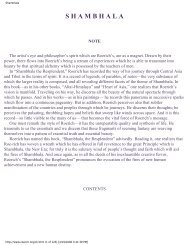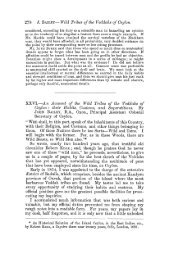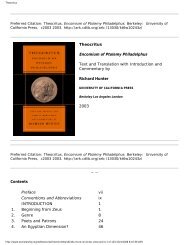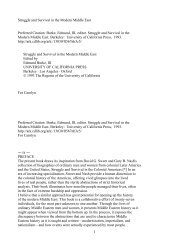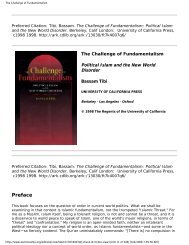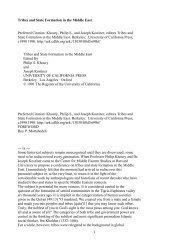Between Two Worlds Kafadar.pdf
Between Two Worlds Kafadar.pdf
Between Two Worlds Kafadar.pdf
Create successful ePaper yourself
Turn your PDF publications into a flip-book with our unique Google optimized e-Paper software.
Latin sources for important discoveries. (See the Selected Bibliography under<br />
these names.) This research was not generated directly by the debate concerning<br />
the rise of the Ottoman state, however.<br />
For research and debate on the Kayi, see Köprülü's introduction to the Turkish<br />
edition of his work (pp. xxv-xxvi in the English translation).<br />
56. Rudi Paul Lindner, Nomads and Ottomans; G. Káldy-Nagy, "The Holy War ( jihad<br />
* ) in the First Centuries of the Ottoman Empire," Harvard Ukrainian Studies<br />
3/4(1979-80):467-73; R. C. Jennings, "Some Thoughts on the Gazi-Thesis," WZKM 76<br />
(1986):151-61; Colin Heywood, "Wittek and the Austrian Tradition" Journal of the<br />
Royal Asiatic Society (1988):7-25; idem, "Boundless Dreams of the Levant: Paul<br />
Wittek, the George-Kreis, and the Writing of Ottoman History," ibid.<br />
(1989):30-50; Colin Imber, "Paul Wittek's 'De la défaite d'Ankara la prise de<br />
Constantinople''' JOS 5(1986):65-81; idem, "The Ottoman Dynastic Myth," Turcica<br />
19(1987):7-27; idem, "The Legend of Osman Gazi" OE, 67-76. Also see idem, The<br />
Ottoman Empire, introduction. A similar attitude to the gaza thesis is displayed<br />
in the philological analyses of Sinasi * Tekin in his "Türk Dünyasinda Gaza ve<br />
Cihad Kavramlari Üzerinde Dusunceler * ," in two parts in Tarih ve Toplum<br />
19(1993):9-18 and 73-80. It has been a happy coincidence to see that Dr. Feridun<br />
Emecen of Istanbul University has recently produced a critique of Tekin's<br />
position, as well as some of the works mentioned in this note, that makes an<br />
argument close to mine and uses some of the same evidence; I am grateful to him<br />
for showing me his "Gazâya Dair: XIV. Yüzyil Kaynaklari Arasinda Bir Gezinti,"<br />
Hakki Dursun ¡ ildiz'a Armagan * (Istanbul, forthcoming).<br />
57. Lindner, Nomads and Ottomans , 2. For further elaboration of this point, see<br />
also his "What Was a Nomadic Tribe?" Comparative Studies in Society and History<br />
, 1982, 689-711. For a critique of Lindner's understanding of tribalism, see<br />
Richard Tapper, "Anthropologists, Historians, and Tribespeople on Tribe and<br />
State Formation in the Middle East," TSF, 48-73.<br />
58. Lindner, Nomads and Ottomans , 2.<br />
59. The predilection to pass inquisitorial judgment on Muslims who display<br />
certain tendencies that are considered uncanonical can also be observed, as<br />
Muhsin Mahdi points out, among the historians of thought who are ready to place<br />
medieval Muslim philosophers like Ibn Sina * (Avicenna) outside the community of<br />
believers. See his "Orientalism and the Study of Islamic Philosophy" Journal of<br />
Islamic Studies 1(1990):73-98.<br />
60. Jennings, "Some Thoughts" 155, 153.<br />
61. Káldy-Nagy, "Holy Wary 470. See also p. 469 for the same point made with<br />
respect to earlier Turkish warlords such as Artuk * (d. 1091).<br />
62. It seems more appropriate to read the change in naming practices as a<br />
question of identity rather than one of sincerity, reflecting a deemphasis on<br />
the Turkic traditions in the self-definition of the early Ottomans as formulated<br />
by M. Kunt, "Siyasal Tarih, 1300-1600," in Türkiye Tarihi, ed. S. Aksin *<br />
(Istanbul, 1987-88), 2:36-37.<br />
63. R. P. Lindner, "Stimulus and Justification in Early Ottoman History; Greek<br />
Orthodox Theological Review 27(1982):216.<br />
64. Michel Mazzaoui, The Origins of the Safavids: Ši'ism, Sufism, and the Gulat<br />
* (Wiesbaden, 1972).<br />
65. Al-Saka'ik * al-nu`maniyya * , trans. Mecdi * Efendi, as Hada'iku's-saka'ik<br />
* , ed. A. Özcan (Istanbul, 1989), 31-33.<br />
144




